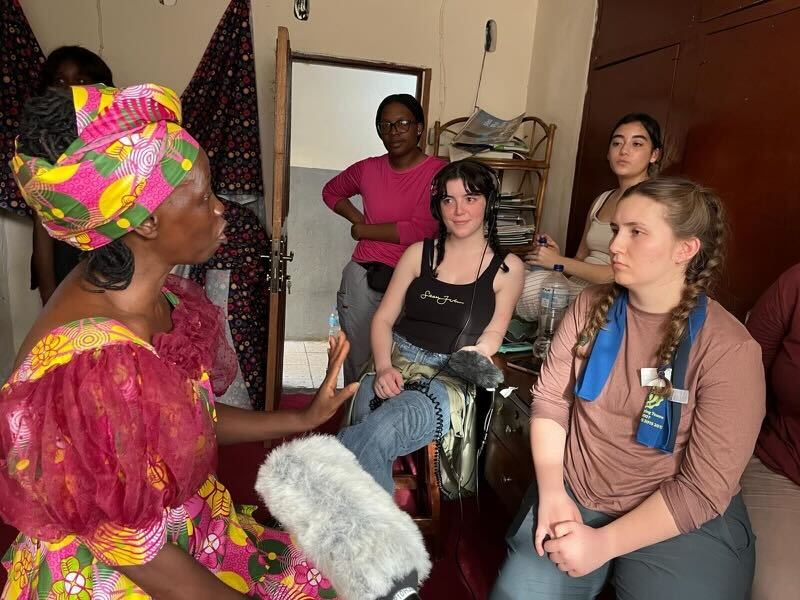On March 6, six Illinois students left for Sierra Leone under the supervision of professors Charles “Stretch” Ledford and Alison Davis. Partnered with students from Fourah Bay College in Freetown, Sierra Leone, the group set out to document the cultural taboos surrounding menstrual cycles and local efforts to make information and period products accessible. Journalism students Piper Pascarella, Faith Lee, Stephanie Wayda, Elena Cleary, Maggie Knutte and Nour Longi were involved in the trip.
The documentary was an invite-only project for JOUR 460: Special Topics, led by Davis and Ledford.
Due to cultural taboos surrounding periods and the lack of menstrual infrastructure in Sierra Leone, many girls do not know what to do when they experience their first menses. Many girls are forced to skip school during their cycles, creating a barrier to quality education and life from a young age.
“From Shame to Celebration: Sierra Leonean Women Reframe the Culture of Menstruation” documents a collection of lived experiences and hardships that make monthly cycles difficult to manage with everyday life. Because of the high inflation in the country, families often have to decide between putting food on the table and buying period products.
Grassroots group Uman Tok has dedicated its work to leading school workshops and educating girls on sexual health to address the large gap in accessibility. Uman Tok translates to “woman talk,” and its goal of making sexual health a more open topic in Sierra Leone is at the center of the documentary.
Get The Daily Illini in your inbox!
Uman Tok distributes feminine health kits, called “Days for Girls Kits,” made up of reusable pads, accompanying waterproof shields, panty liners, a washcloth and soap. The kit is also complete with an instructions sheet. During its workshops in schools, the organization demonstrates the proper usage of these kits to students.
“It’s a woman’s story, a chance to showcase women who otherwise might not get the opportunity to get their stories shown,” said Stephanie Wayda, senior in Media and director of photography of the project.
Elena Cleary, junior in ACES, underscored the commitment the documentary required, describing it as “extremely immersive” and “not for everybody.”
For cultural competency on the topic, professor Sophie King-Hill from the United Kingdom’s University of Birmingham taught lectures to the University students as a specialist in sexual behaviors and assessment in young people. Additionally, she conducted one-on-one interviews to gain better insight into students’ individual trajectories in the project and to answer any questions.
Given the sensitive nature of the topic, King-Hill assisted students in coping with the many difficult conversations they had with the Sierra Leonean women.
“(It’s) very heartbreaking,” Wayda said. “There has been a lot of tragedy in Sierra Leone.”
However, it was not all tragedy. African countries are often portrayed to be in a state of perpetual devastation, but “From Shame to Celebration” is a story of hope.
“It was empowering,” said Cleary when recounting the experience.
Among the most striking takeaways for the Illinois students was the overwhelming sense of community.
“(The community is) paramount in Sierra Leone, the way people interact with one another is not individualistic like here in the U.S.,” Wayda said.
The University students received warm welcomes from the organization they were documenting.
“They sang a song for us, thanking us for the care we had for their stories,” said Piper Pascarella, sophomore in Media.
Afterward, the students were given Sierra Leonean names that they were referred to for the rest of the trip.
“For me personally, I felt like seeing the way these people lived was completely different from anything I had ever known,” Pascarella said. “I grew up with things being handed to me. The children are dancing in the streets, they’re dancing and singing and playing. You can see the humanity in them that is also here, if not more.”
By the end of the trip, the Fourah Bay students were the hardest goodbyes for the University students. For Wayda, being able to see how young journalists overcome adversity was extraordinary.
Cleary recounts the Fourah Bay students only knowing basic media software and the Illinois team training them to use a professional camera.
“They never felt like they were unlucky even though they were living a completely different life,” Cleary said.
“From Shame to Celebration” is not intended to be a story of despair, but one of hope. The documentarians emphasize that Sierra Leone’s culture is one that deserves to be celebrated in its own right, not just as part of a monolith that erases the uniqueness of cultures across Africa.
Currently, the group is in the process of submitting “From Shame to Celebration” to premiere at various film festivals. On April 25, they will present the trailer at the Illini Union Undergraduate Research Symposium.
Across the world, even in wealthy countries such as the United States, period poverty remains an issue for menstruators who lack the financial means to acquire products. This documentary is only part of a larger story, showcasing the humanity in all peoples of all different walks of life.
“It was very striking to me how life is really the same everywhere, you’re just in a different place,” Wayda said.






